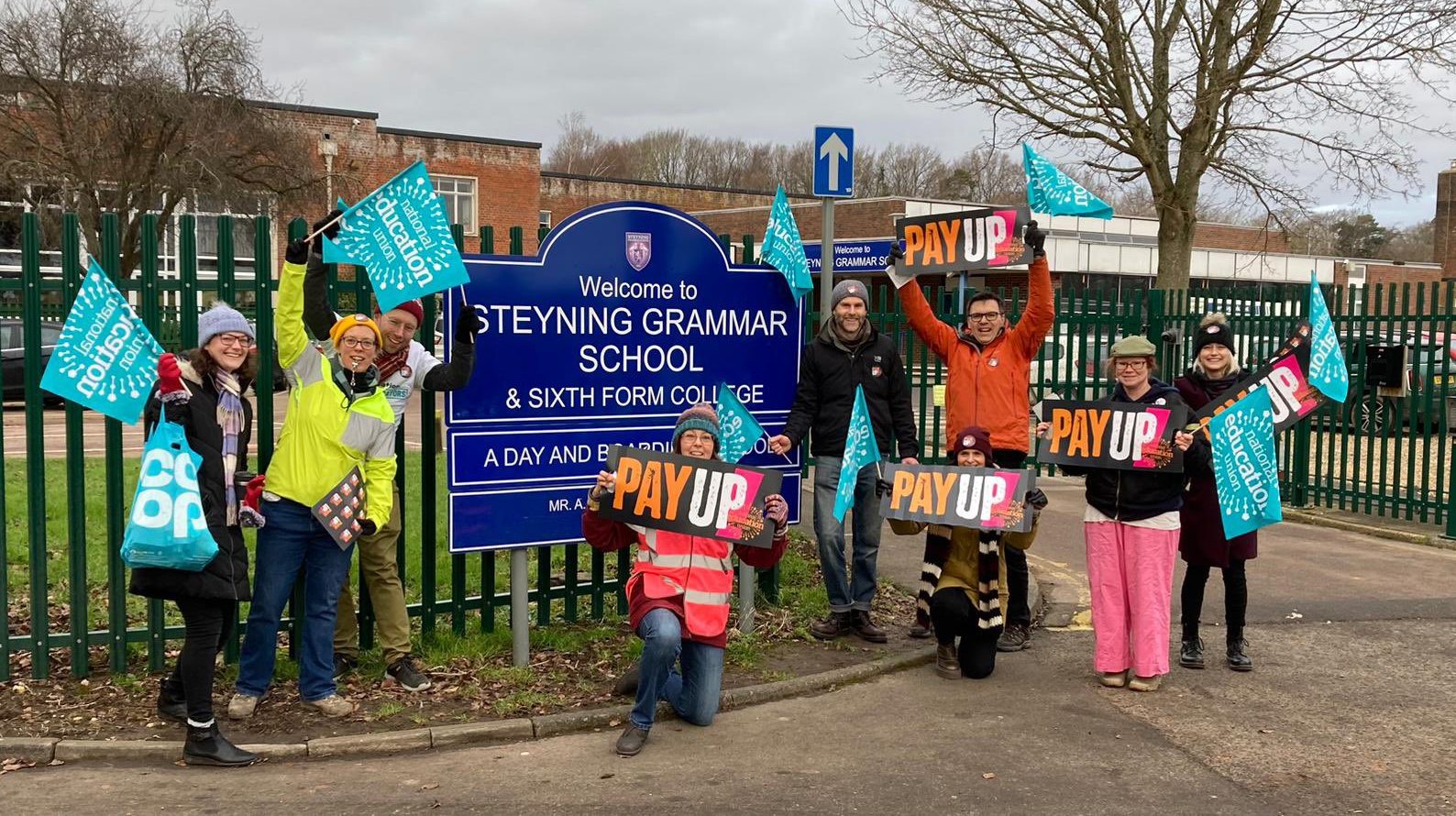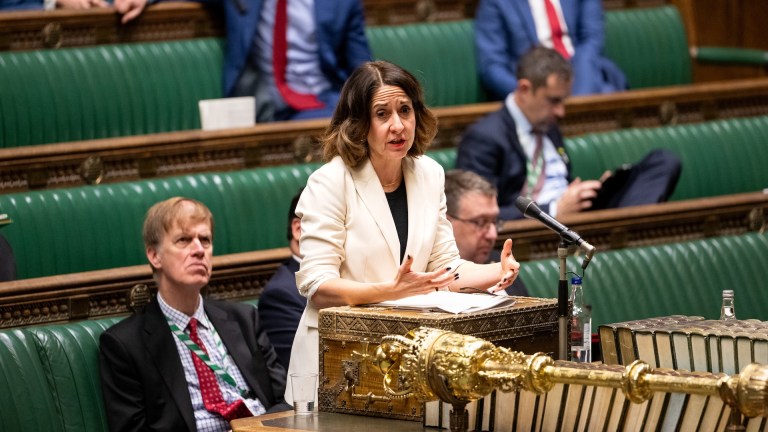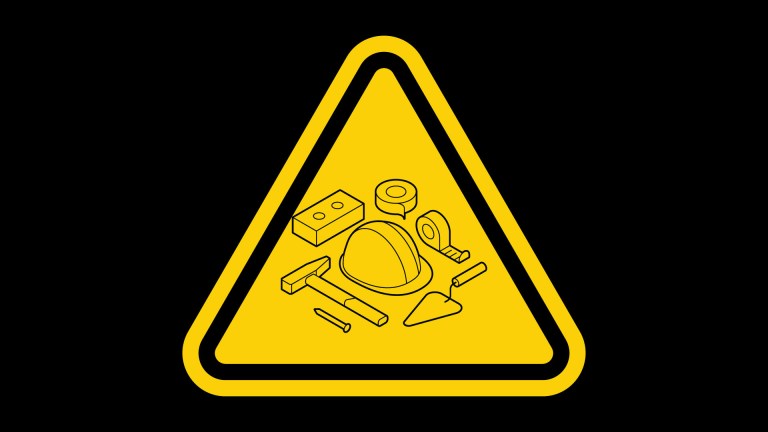But the current driver of the UK’s inflation is the high price of food and fuel, as anybody who has set foot in a supermarket or checked an energy bill recently will be aware of.
These are driving a perilous situation for the UK economy. Inflation for May 2023 was 8.7%, down from over 10% in the winter. But this doesn’t mean prices have fallen – as long as inflation is positive, prices are rising.
Inflation isn’t felt evenly. Food inflation – the increase in how much groceries cost – was at 18.3%.
The Bank of England, as part of its mission to get inflation down to 2%, has raised interest rates to 5% – the 13th consecutive increase.
What does the government say about pay rises and inflation?
As hundreds of thousands of workers take to the streets, the government has urged caution. Pay rises would keep inflation high, Jeremy Hunt has warned.
It’s a line repeated by other ministers. Immigration minister Robert Jenrick said meeting pay demands would be “the worst thing that we could do.”
Advertising helps fund Big Issue’s mission to end poverty
Your support changes lives. Find out how you can help us help more people by signing up for a subscription
So do the claims on pay rises fuelling inflation actually hold up?
Economists have cast doubt on the idea, especially in the UK’s current economic climate.
Henry Parkes, senior economist at IPPR, said the government had offered “very little by way of explanation” as to how pay rises would drive inflation. Higher wages can push prices up by increasing demand, but public sector pay rises would only affect one in five workers, Parkes added.
He told The Big Issue: “Inflation is largely being driven by soaring energy prices and the fallout from Covid, and so rather than suppressing wages for hard working families keeping the country going, the government would be wiser to focus on profit restraint for companies making billions out of this crisis. A bigger risk is that the squeeze on household incomes is going to push the economy into a recession.
“It’s right that higher wages can increase demand and so have some inflationary pressure, but the rises only affect one in five workers. Furthermore, in other areas demand is actively being sucked out of the economy through the highest interest rates since 2004, whilst the Bank of England found that investment intentions are plummeting.”
Pay rises would not outstrip productivity improvements, and are lower than existing pay rises in the private sector, meaning they’d contribute little to inflation, said Hannah Slaughter, senior economist at the Resolution Foundation. “The actual problem the government is worried about is how to pay for higher pay settlements, balanced against needing to fill damaging staff shortages across the public sector,” she said.
Advertising helps fund Big Issue’s mission to end poverty
In fact, pay rises would simply mean people were able to pay existing prices, which are being set abroad, said economist James Meadway.
“The claim that pay rises would be ‘inflationary’ is laughable. At a time when pay, in real terms is falling rapidly all a rise will do is compensate people for high prices. And those high prices are coming from very rapid increases in the price of energy and food, imported from elsewhere in the world,” Meadway told The Big Issue.
Adding that the UK’s looming recession is fuelled by a lack of spending, Meadway said: ”Paying nurses in Britain less doesn’t suddenly mean Qatar charges us less for natural gas to compensate – this isn’t how the economy works.”
Get the latest news and insight into how the Big Issue magazine is made by signing up for the Inside Big Issue newsletter
Is the wage-price spiral real?
In more general terms, fears about pay rises fuelling inflation are founded on a piece of theory known as “wage-price spirals” – a phenomenon where wages and prices increase together.
However, a study by the IMF in November 2022 cast major doubt on these events.
Advertising helps fund Big Issue’s mission to end poverty
“Perhaps surprisingly, only a small minority of such episodes were followed by sustained acceleration in wages and prices. Instead, inflation and nominal wage growth tended to stabilise, leaving real wage growth broadly unchanged,” the study found.
In other words, increasing wages does not necessarily make inflation worse. Or, as it put it: “An acceleration of nominal wages should not necessarily be seen as a sign that a wage-price spiral is taking hold.”
Could greedflation be another explanation?
Even the Bank of England is now admitting retailers are increasing their profits as shopping prices continue to rise.
The bank’s narrative has long been that wage rises are fuelling inflation. But new evidence shows another story – fuelling suspicions of “greedflation”, which take root any time you see a shelf and think supermarkets are doing just a bit too well from the rising price of butter.
Goods price inflation is rising despite a fall in the inflation faced by those producing goods. Or, as Bank of England governor Bailey put it in a letter to chancellor Hunt: “The continued pass-through of costs to consumer prices may also be indicative of some rebuilding of profit margins by retailers”. In ever simpler terms, the amount you pay for your shopping is rising by more than the cost it takes to make those items.
These new stats add to a growing counter-wind to the “wage-price spiral” narrative, which has been used as a key reason to turn down the pay demands of striking workers. The IMF has said corporate profits are the biggest driver of inflation in Europe, while in the UK pay rises for the top 10% of earners have been driving price rises. Christine Lagarde, the president of the European Central Bank, said interest rates and inflation would remain high without firms accepting lower profits.
Advertising helps fund Big Issue’s mission to end poverty
So what’s to be done? Responding to Bailey, Hunt said he will meet with regulators to make sure the falling cost of production is passed on to shoppers.
The Big Issue’s #BigFutures campaign is calling for investment in decent and affordable housing, ending the low wage economy, and millions of green jobs. The last 10 years of austerity and cuts to public services have failed to deliver better living standards for people in this country. Sign the open letter and demand a better future.










